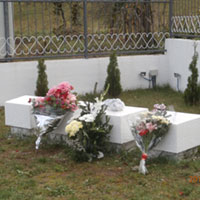Ministry Stronger than Any Court or Law: Families of Victims from Sjeverin Still Deprived of their Legal Rights

On receiving the order of the Administrative Court to decide once more on the request filed by Rasim Pecikoza, the Ministry of Labour, Employment, Veteran and Social Affairs again refused to grant him, as a family member of a civilian victim of war, the right to a monthly cash benefit, and explained this decision by stating that this right cannot be granted to a victim who died outside the territory of Serbia. The Humanitarian Law Center (HLC), which represents Rasim Pecikoza, holds that the Ministry has acted in violation of the law and contrary to the positions taken by the Administrative and Constitutional Courts, thus placing itself above judicial institutions, and has confirmed its earlier intention to deprive the greatest number of civilian victims of war in Serbia of their legally guaranteed rights. The HLC will again seek, in this case and in other similar cases, protection before the Administrative Court on behalf of the plaintiffs.
Rasim’s son, Sead Pecikoza, was killed as a civilian after he was kidnapped on October 22nd, 1992, together with 15 other individuals of Bosniak nationality, from a bus in the vicinity of the town of Sjeverin near Priboj and taken by members of the Serb Volunteer Unit known as the “Avengers” (“Osvetnici”) in the direction of Višegrad. As was established in the judgment delivered by the District Court in Belgrade, he was brutally tortured and then killed, whilst his body has not been found even 24 years after the occurrence of the crime.
Procedure for attaining the status of a civilian victim
In July 2012, Sead’s father, Rasim, filed a request seeking to attain the status of a family member of a civilian victim of war, on the basis of the Law on the Rights of Civilian Invalids of War. The Law prescribes the possibility to obtain this status for members of the immediate family (parents, spouse and children) of a person who was killed or died as a civilian in an enemy wartime operation during the execution of military operations, on account of residual war ordnance, enemy sabotage or terrorist actions. The Municipal Administration in Priboj, however, dismissed the request, and so did the aforementioned Ministry when deciding upon the appeal, with the explanation that the Law cannot be applied in cases which occurred outside the territory of Serbia. These two administrative bodies referred to the fact that the residents of Sjeverin and the surrounding villages were intercepted and kidnapped at a small section of the road between Sjeverin and Priboj, which crosses the territory of Bosnia and Herzegovina (BiH).
After the legal claim demanding the annulment of this administrative decision was dismissed as well, the HLC filed a constitutional complaint on behalf of Rasim Pecikoza. In August of the last year, the Constitutional Court upheld his constitutional complaint and ordered the Administrative Court to re-decide on the claim. The Administrative Court did so by sending the case back to the Ministry to render a new decision. The Ministry rendered a decision which was identical to the previous decision, and once again dismissed the request with essentially the same reasoning.
Modification in the interpretation of the Law
The relevant provisions of Articles 2 and 3 of the Law on the Rights of Civilian Invalids of War does not mention anywhere that only a person who was killed or died on the territory of the Republic of Serbia can be considered a civilian victim of war. The judicial practice had also demonstrated that the place of death was not a decisive fact in this respect, and consequently, a great number of victims, people who fled Croatia and BiH and were refugees in Serbia, had been granted disability payments and monthly cash benefits, on the basis of injury or killing of a family member. However, their rights were subsequently abolished. This happened precisely at the time when the HLC filed requests on behalf of the family members of the Bosniaks from Sjeverin who had been killed. Since the municipal authorities dismissed their requests, the HLC filed an appeal pointing out that they were being discriminated against. It was then that the Ministry decided to change its interpretation of the Law in order to “make all plaintiffs equal” in their rights, and went to deprive all victims and their families originating from Croatia and Bosnia and Herzegovina of their rights (most of them are victims of Serb nationality), instead of approving the requests of 15 families from Sjeverin.
Principles of “state sovereignty” and “territorial application of law”
Unfortunately, the courts followed the moves made by the Ministry to a great extent in their rulings, in which they made references to the “principle of state sovereignty” and “territorial application of the law”. According to the former principle, the Law on the Rights of Civilian Invalids of War is perceived as a law of the Republic of Serbia as a republic of the Socialist Federal Republic of Yugoslavia (SFRY), since in the former Yugoslavia jurisdiction over the so-called veteran and invalids protection was divided between the then republics. Such an interpretation is redundant from the historical point of view, since all former federal laws became laws of the Republic of Serbia in 2003. Whilst the Law on the Rights of Civilian Invalids of War, passed in 1996, is undoubtedly a law of the republic. However, this fact cannot be the starting premise for the determination of the scope of the territorial application of this Law. The position has been taken by the Ministry and the courts that the Law in question could have applied in cases which occurred outside the territory of Serbia only if this was explicitly prescribed by a legal provision. Since such a provision does not exist, it is not logical to draw the conclusion that it should exist. Even if the intent of the legislator in the former SFRY was to apply the laws of a republic exclusively to the territory of particular republics, such a provision would have been explicitly stated in the law. Legislation covering such matters had always referred to the area of social policy at the level of the republics, and the division of jurisdictions was connected solely to the question of the beneficiary’s place of residence (or citizenship), and not to some other circumstances); and the previously established practice confirms this position.
Finally, the Serbian Law on the Rights of Civilian Invalids of War was passed in 1996, shortly before the end of the conflicts in Croatia and Bosnia and Herzegovina. If the intention of the legislator was to exclude victims from these conflicts who live in Serbia from the application of this Law, it would have been simply stated in the Law.
Violation of the rights guaranteed by the Constitution
In any case, a sudden turn in the aforementioned practice was not only unjustified, but it was not based on the law, and it has led to the violation of plaintiffs’ right to a fair trial and deliberation of their legal rights – and the Constitutional Court of Serbia has established this in the case of Rasim Pecikoza. We are not talking about a legal void in this case, but about a violation of the rights of a great number of citizens, who either had reasonable expectations that their requests would be approved, or had already realized their right, only to find it subsequently abolished. In its own practice, the Constitutional Court explained the inadmissibility of such a practice as we have described, by stating: In certain cases, it is necessary for courts to modify their legal position, but this may happen only if the legally determined procedural conditions are met. The complexity and dynamics of legal relations that are being resolved in an administrative dispute result in a more frequent modification of legal positions in judicial practice than might be the case in other areas of law. However, the decision of the Supreme Court in the concrete legal situation was not a result of the modification of legal position in judicial practice. (decision of the Constitutional Court no. Už-148/2008). When speaking about the requests of civilian victims of war, in the absence of any amendment to the Law or any other circumstance, there was essentially no argumentation for rendering a decision contradictory to the previously existing practice, despite the formal reference to the principles of state sovereignty and territorial application.
Pursuant to Article 18 of the Constitution of Serbia, the provisions on human and minority rights are to be interpreted to the benefit of promoting the values of a democratic society, pursuant to valid international standards in human and minority rights, whereas pursuant to Article 20 of the Constitution, the level of human and minority rights already attained may not be lowered. Article 69 of the Constitution prescribes the citizens’ right to social welfare, the provision of which is based on principles of social justice, humanitarianism and the respect for human dignity. The administrative authority must decide upon citizens’ requests respecting at all times the principles of legality and the protection of citizens’ rights prescribed by the Law on General Administrative Procedure.
Therefore, the position taken by the Ministry in the case of Rasim Pecikoza, and also in a number of other cases, according to which the rights prescribed by the Law do not belong to families of the citizens of Serbia who were killed or died in the armed conflicts on the territory of other republics of the former Yugoslavia, represents a violation of the constitutional and legal obligations of administrative authorities to work on the basis of the law, because it is primarily based on the allegation that the conditions prescribed by the law had not been met, when in fact such conditions do not even exist in the Law at hand.
Degradation of victims’ rights as state policy
The Bill of Rights of War Veterans, Military and Civilian Victim of War and Their Family Members, which is supposed to replace the existing Law and which the Ministry of Labour, Employment, Veterans and Social Affairs presented and opened for public discussion in December 2014, shows that the case described herein does not represent a mere mistake in the interpretation of the Law. Pursuant to the Bill, a civilian victim of war is a person who lost their life on the territory of the Republic of Serbia (Article 19 as read with Article 18 of the Bill). The intention of the responsible Ministry was to complete its endeavour aimed at the annulment of the already inadequate rights of citizens and their families who had suffered on the territory of other republics of the former Yugoslavia, by including an explicit legal provision to the detriment of this sensitive social category. Unfortunately, the highest judicial authorities in Serbia have expressed a similar intention in depriving victims of their rights, in compensation lawsuits initiated by victims of war crimes and other gross human rights violations against the Republic of Serbia, by interpreting legal and procedural provisions to the detriment of the victims and to the benefit of the state wherever it was possible. Because of this worrying tendency, the Council of Europe Commissioner for Human Rights sent a letter to the Serbian authorities in September last year, and the position of civilian victims of war in Serbia will be a subject of discussion before the UN Human Rights Committee as part of the third periodical reporting cycle on the situation in Serbia.








